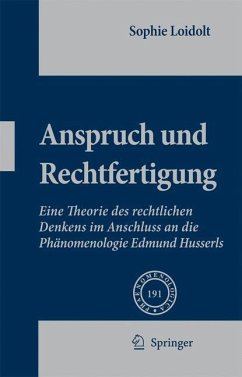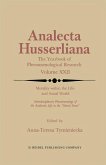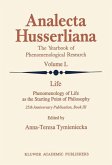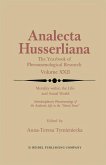Anspruch und Rechtfertigung entwickelt eine phänomenologische Theorie des 'rechtlichen Denkens'. Dabei handelt es sich um eine erste systematische Untersuchung derjenigen Bewusstseinsstrukturen, die ein Begründen, Ausweisen und Rechtfertigen überhaupt erst ermöglichen.
Die grundlegende Frage ist, wie Rechtsansprüche, die sowohl erkenntnistheoretischen als auch ethischen Urteilen inhärent sind, als ein Grundmerkmal des Erfahrens verstanden werden können. Die vorliegende These gibt eine genetische Antwort auf diese Frage. Sie führt den Rechtscharakter im Denken auf einen ursprünglichen Anspruch zurück, dem Bewusstsein im Erfahren immer schon ausgesetzt ist. Rechtliche Strukturen müssen daher als eine prädikative Antwort auf ein vorprädikatives Angesprochen-Sein begriffen werden.
Das vorliegende Buch untersucht sowohl den ethischen als auch den erkenntnistheoretischen Bereich, wobei Husserls genetische Phänomenologie in Erfahrung und Urteil den methodischen Hintergrund bildet. Es bietet außerdem eine neue und umfassende Lektüre von Husserls Schriften zur Ethik, sowie einen kritischen Dialog mit der Alteritätsethik von Levinas und der Diskursethik Apels.
Anspruch und Rechtfertigung (Appeal and Justification) develops a phenomenological theory of judgments on legitimacy. It undertakes a first systematic investigation of the structures in consciousness which enable the process of justification to unfold.
The overall question is how the claim for legitimacy, inherent in both epistemological and ethical judgments, can be understood as a fundamental character of experience. The thesis that this book offers follows along the lines of a genetic answer to this question. It traces the characteristic of legitimation back to an originary appeal to which consciousness is exposed by experience. Legitimizing structures are thus to be understood as a predicativeanswer to this prepredicative appeal.
This book investigates both the epistemological and the ethical fields, working mainly with Husserl's genetic theory in Experience and Judgement. It offers a new and comprehensive reading of Husserl's ethics and a critical dialogue with Levinas' ethics of alterity and Apels' discourse ethics.
Die grundlegende Frage ist, wie Rechtsansprüche, die sowohl erkenntnistheoretischen als auch ethischen Urteilen inhärent sind, als ein Grundmerkmal des Erfahrens verstanden werden können. Die vorliegende These gibt eine genetische Antwort auf diese Frage. Sie führt den Rechtscharakter im Denken auf einen ursprünglichen Anspruch zurück, dem Bewusstsein im Erfahren immer schon ausgesetzt ist. Rechtliche Strukturen müssen daher als eine prädikative Antwort auf ein vorprädikatives Angesprochen-Sein begriffen werden.
Das vorliegende Buch untersucht sowohl den ethischen als auch den erkenntnistheoretischen Bereich, wobei Husserls genetische Phänomenologie in Erfahrung und Urteil den methodischen Hintergrund bildet. Es bietet außerdem eine neue und umfassende Lektüre von Husserls Schriften zur Ethik, sowie einen kritischen Dialog mit der Alteritätsethik von Levinas und der Diskursethik Apels.
Anspruch und Rechtfertigung (Appeal and Justification) develops a phenomenological theory of judgments on legitimacy. It undertakes a first systematic investigation of the structures in consciousness which enable the process of justification to unfold.
The overall question is how the claim for legitimacy, inherent in both epistemological and ethical judgments, can be understood as a fundamental character of experience. The thesis that this book offers follows along the lines of a genetic answer to this question. It traces the characteristic of legitimation back to an originary appeal to which consciousness is exposed by experience. Legitimizing structures are thus to be understood as a predicativeanswer to this prepredicative appeal.
This book investigates both the epistemological and the ethical fields, working mainly with Husserl's genetic theory in Experience and Judgement. It offers a new and comprehensive reading of Husserl's ethics and a critical dialogue with Levinas' ethics of alterity and Apels' discourse ethics.








